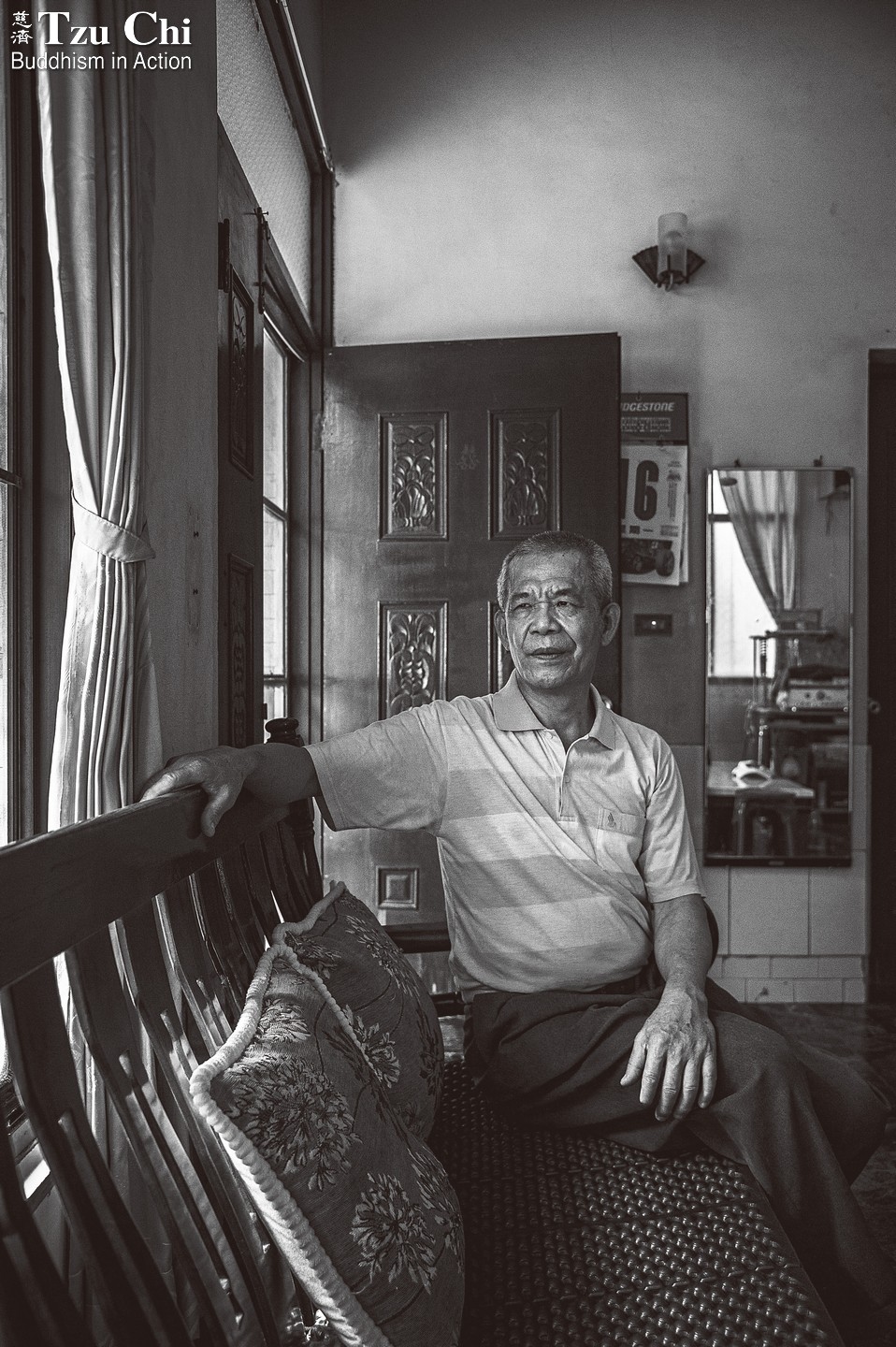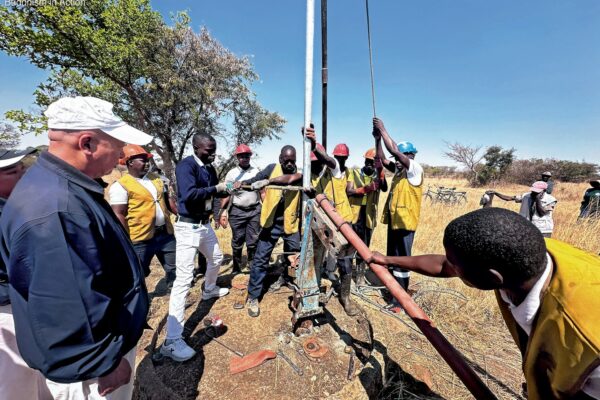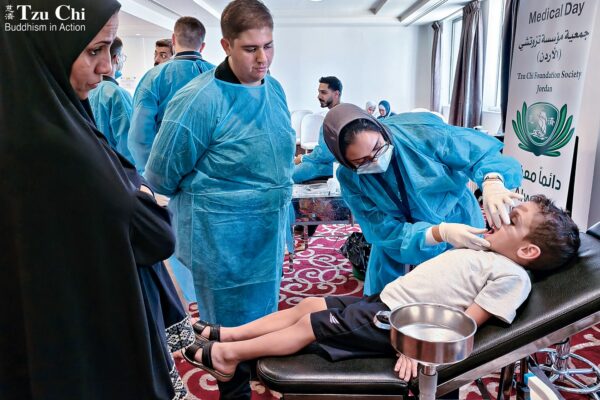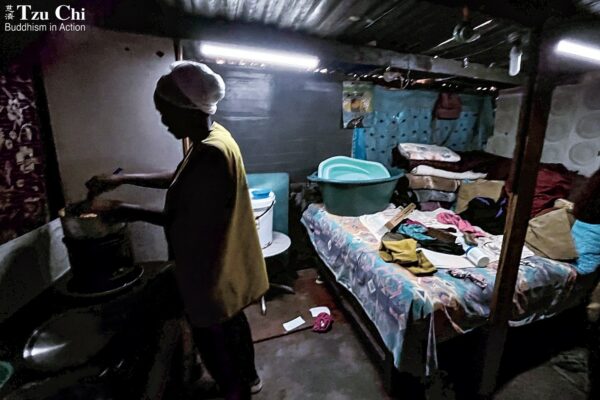By Huang Xiao-zhe and Cai Yu-xuan
Translated by Wu Hsiao-ting
Photos by Huang Xiao-zhe

At first glance, the man in the photo here, the protagonist of this story, appears to be completely ordinary. It’s unlikely anyone can tell that he is blind. Similarly, our subject probably never imagined that his journey with blindness would evolve into the most extraordinary chapter of his life.
Shen Wen-nan (沈文楠), 69, lives in Xinhua District, Tainan, southern Taiwan. Eighteen years ago, while employed as a maintenance worker in a textile factory, he began to notice a gradual decline in his ability to distinguish fabrics of different colors. Following a medical examination, he received a diagnosis of retinitis pigmentosa, a genetic condition leading to progressive vision loss. His vision deteriorated to the extent that he was compelled to retire in his early 50s. He sought help everywhere in pursuit of a solution to his diminishing sight, but was ultimately disappointed by the final verdict: there was no cure for his condition. The news extinguished the faintest glimmer of hope to which he had been clinging.
Shen’s eyesight plummeted to near-total blindness in just a few years, separating him forever from the vibrant tapestry of the external world. But what commands admiration is his refusal to be defeated. He relearned life skills to adjust to a new life in the dark, and even sought ways to contribute to charitable causes despite his visual limitations. Despite the absence of sight, he invited light into the window of his soul. In this brave stance, he redefined the value of his life and broke free from the constraints of his visual limitations.
Independence in darkness
Shen lives by himself, but a caregiver visits three times a week to help with cleaning and shopping. Though visually impaired, his home remains remarkably tidy; everything has a designated place, which helps him in locating items. He independently manages all aspects of his meals—from preparing ingredients to cooking and washing dishes—with an ease and nimbleness that belie the challenges of his situation.
We were quick to notice during our first visit to Shen’s home that all the lights were off. Accustomed to well-lit spaces, we felt a sense of unease and discomfort in the absence of light. For Shen, however, such darkness is a daily reality. Instead of light, he relies on the tactile sense of his hands to navigate his home and the life experience he has accumulated to identify objects.
Shen talked about the time right after losing his vision, during which his daily life was significantly impacted. Moving around, completing simple household chores, and preparing his meals were very difficult. Fortunately, with help from Tainan City’s Social Affairs Bureau and a referral to the Eden Social Welfare Foundation, he learned valuable life skills and self-care techniques at the Center for the Rehabilitation of the Visually Impaired, thus gradually regaining independence.
Thoughtful companionship
Chen Ting-ren (陳廷任) is a Tzu Chi volunteer residing in Xinhua District, where Shen’s home is located. He became a vital presence in Shen’s life after he lost his sight.
Though it was not yet seven a.m. on this particular day, Chen had already arrived at Shen’s home in a car to take him to the Tzu Chi Xinhua Recycling Station for volunteering. Upon arrival, Chen promptly approached Shen, allowed him to hold onto his arm, and guided him into the car. The same considerate assistance was repeated when they reached the recycling station. Chen’s actions were touching—he was like a caring guardian by Shen’s side.
Chen shared the story of how he began supporting Shen. Upon receiving a phone call about Shen’s situation, he visited and discovered that Shen had become a widower early in life and had two married daughters who rarely returned home. Observing Shen living alone and coping with vision loss, Chen empathized with him, contemplating how challenging his situation must be. Recognizing that Shen needed companionship, he took the initiative to provide support. Shen initially lacked the confidence to become a recycling volunteer because of his vision challenges, but received encouragement and patient guidance from Chen. With Chen’s assistance, he embraced volunteering, rediscovering a sense of purpose in life and regaining his self-worth.
Unhindered by blindness
Chen led Shen to the sorting area upon arriving at the Xinhua Recycling Station. The two of them then proceeded to carry out their respective tasks. Chen would occasionally check in with Shen, appearing by his side to ensure there were no issues related to sorting. We noted during our observations that Shen wore only one glove while sorting recyclables, on his left hand, leaving his right hand uncovered. The reason became clear upon closer scrutiny: due to his visual impairment, he relied on the sense of touch in his right hand to identify materials, sometimes using that hand to knock on items for identification. Surprisingly, despite his blindness and the myriad types of recyclables, he accurately classified over 95 percent of what passed through his hands, and with impressive speed too. Only a few peculiar items required further confirmation by another volunteer.
Shen expressed gratitude for the attention and consideration shown by fellow volunteers while he serves at the recycling station. They take special care to prevent hazardous foreign objects, such as broken glass or nails, from falling into the piles of recycling awaiting sorting, thereby minimizing the risk of harm to him. They assist him during breaks in using the restroom and bring him snacks. They chat and laugh together, creating a familial atmosphere that makes him feel warm and cared for. In the collective efforts and kindness surrounding him, he finds a supportive community that empowers him to contribute meaningfully.
Important people in his life
The two photos in this section of the article exude the beauty of contented happiness. In one, Shen is accompanied by his second daughter and granddaughter. It was a rare occasion that the mother and daughter returned from Japan to reunite with Shen. Although their time together was brief, it brought a profound sense of familial joy to him. The other photo captures Shen and Chen, who had just returned to Shen’s home after volunteering at the recycling station. Despite being covered in sweat, they radiated joy and satisfaction. The former photo illustrates the deep bond of blood relations, while the latter demonstrates a friendship between two men who are like brothers to each other.
Particularly heartwarming was the spontaneous interaction between the two men. As they prepared for the photo, they naturally held hands, fingers intertwined, revealing a close emotional connection and conveying unspoken gratitude and emotion towards each other. Chen never quantified his contributions to Shen; instead, he was grateful for the opportunity Shen gave him to contribute. Shen, in turn, was filled with a deep sense of appreciation towards Chen. “He’s had such an important, positive impact on my life,” he said of Chen. “We’ve known each other for seven years now, and he has been there for me along the way, instrumental in helping me unlock the positive potentials of life after the loss of my eyesight. Thanks to him, I’ve gained a new lease of life.”



